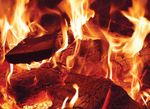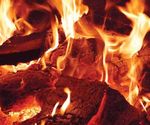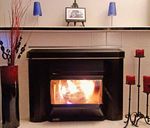Warm up wisely Getting the best out of your wood burner
←
→
Page content transcription
If your browser does not render page correctly, please read the page content below
warm up wisely
Getting the best out of your wood burner
Introduction
Air Pollution Lighting Your Fire
This guide offers key information on how
Air pollution is a problem in • Open the air control.
to enjoy your wood burner safely, get
both Invercargill and Gore the best heat out of your firewood and • Put screwed up
during winter. At times it decrease the amount of smoke being newspaper at the base.
reaches alert levels, which released into the air. • Criss-cross the newspaper
means the level of small
Many people burn wood as a source of with plenty of kindling.
particles (PM10) exceeds the
national standards designed heat and enjoyment. It’s economical, • Add a few smaller pieces
to protect human health. More renewable and can heat your home well, of wood.
than 90 percent of human- when used effectively. • Light the newspaper in
caused PM10 is a result of The efficiency of wood burners varies. several places, starting
burning wood and coal in However, they are preferable to open from the back.
domestic burners. fires, which actually draw heat from your • Load wood loosely so air
The Government has set target home. can circulate.
deadlines for meeting the A wood burner or open fire that is not • Always use dry wood.
national standards for PM10 – being used efficiently can produce
for Gore, 1 September 2016 excessive smoke, which wastes energy
and Invercargill, 1 September and your money, builds up dangerous Once Alight
2020. creosote and creates air pollution. Poorly
• Keep the fire burning
As a community we need to maintained wood burners and open fires brightly.
find ways to reduce our levels can also be fire hazards.
• Keep the air control open
of PM10 to meet these targets. for at least 30 minutes.
It is impractical to ban all wood Burning wet or green wood
burners, but we can change • Burn several smaller logs,
and banking fires are major rather than a single, large
how we use them.
contributors to the smoke log.
By operating our burners in
ways that minimise smoke – and air pollution in our • When adding more logs,
fully open up the air
which contains the harmful community. control for 20–30 minutes.
PM10 – we can all contribute
to reducing air pollution and • Ensure the air supply
doesn’t become blocked
improving our air quality.
at the base by a badly
positioned log.
• Don’t bank your fire.
• Don’t burn any rubbish.
BreatheEasySouthland.co.nzBurn smarter
Collecting and storing Here are some tips on keeping your fire burning efficiently so you get the
best value from your firewood and really cut down the smoke.
firewood
• Burn only dry wood that has been split properly. Green wood is a major
The quality of your firewood is contributor of smoke and the creosote that clogs chimneys. The moisture
a major factor in how well your content of wood should be less than 25 percent.
wood burner operates, so the
• If wood is damp or gets rained on, take small amounts inside to dry out
way you store it is vital.
before putting it on the fire.
• Think ahead and get your
• Burn fires bright and hot. A smouldering fire creates more smoke and less
wood supply in summer.
heat. If the glass front on your wood burner is coated with ‘gunk’, it means
• Allow freshly cut wood 8–12 you are not burning your fire hot enough.
months to dry out before
• After starting the fire, and whenever you add more wood, leave the air
use.
controls open for at least 30 minutes. This helps build up a good high
• Store firewood in a dry place temperature, which makes the wood burn well. Extended periods of smoky
with the top covered. emissions occur if you turn down the air supply.
• Stack wood loosely off the • Regularly remove the ashes from your burner or fireplace. Ashes are a fire
ground ideally in a criss- hazard so be sure to store them appropriately – outside in a covered metal
cross pattern to allow air to container placed in a safe area, away from the side of the house.
circulate.
• If your wood burner is smoking excessively, get it checked. Make sure you
• Split big logs before stacking know about your model of burner and how it operates. Ask a wood burner
to help them dry out quicker. supplier if you are not sure.
• Allow your fire to burn out overnight. Banking fires causes excessive smoke
and air pollution over long periods. Keep a supply of kindling handy to re-
start your burner the next day.
• When there are only a few glowing embers left, build up your fire gradually.
Putting too much wood on too soon will create a smouldering, smoky fire.
Burn only dry wood
• Burn only wood. Coal, domestic rubbish, glossy paper, magazines and
– it generates the wrappers, plastic, disposable nappies, electrical cables, treated timber and
most heat and fibreboard, rubber products and waste oils can produce harmful chemicals,
creosote, offensive or objectionable smoke, and air pollution. They may also
creates less smoke. damage your wood burner.Smoky air is a major health risk
Handy chimney
Smoky fires affect everyone in the community. The air pollution they create is a
major risk to people’s health, especially:
checker
• Babies and very young children When you have your fire going,
brave the cold and go outside
• Those suffering from cardiac or respiratory conditions, such as asthma
to check out the smoke coming
• Those with vascular complications from diabetes from your flue.
• Frail, elderly people. • If your smoke looks like
the picture at the top –
On top of that, excessive smoke from fires is unpleasant and detracts from
congratulations! You are
people’s wellbeing and the quality of their environment.
operating your wood burner
effectively.
How smoky is your chimney? • If your smoke resembles that
in the other pictures, your
wood burner is contributing
A well maintained wood burner that is operated effectively will have bright
to air pollution and putting
swirling flames and glowing embers with little or no smoke coming from the
people’s health and wellbeing
chimney. Within 10 minutes of lighting or putting wood on your fire, any visible at risk – you need to do
chimney smoke should, ideally, reduce to a heat haze or faint smoke. something about it.
It may take some practice to get the cleanest burn from your wood burner. To improve the effectiveness of
your wood burner and reduce
the amount of smoke produced,
My wood burner, my responsibility follow the tips in this brochure.
As the owner of a wood burner it is your responsibility to make sure you
manage it effectively so that it does not produce offensive or objectionable
smoke or odour.
Each winter Environment Southland’s pollution prevention team receives
complaints about smoky chimneys. These are referred to the appropriate local
councils.
The Pollution Hotline phone number is 0800 76 88 45.
Wood burner size and installation
Weekly Winter Air
Most wood burners perform best at or close to their maximum output. If you
often run your burner at low settings, your burner may be oversized. Quality Results
If you are buying a new wood burner, or replacing one, it is important to Environment Southland
ensure it meets emission standards and is the right size for the rooms that are monitors air quality in
being heated. It also needs to be installed correctly. The flue is an important Southland and reports the
component of the wood burner installation and needs to be long enough to results for Gore and Invercargill
draw sufficient air for proper combustion of the fuel. each week during the winter
months.
Check with your local council or a wood burner retailer if you think your burner
may not be correctly installed. A wood burner will perform better when located To find out more about air
towards the centre of the home and not against an outside wall. Do your best quality and to view the weekly
to ensure your flue is not positioned where a neighbour will be affected by your results please visit the Breathe
smoke. Easy website.
For a full list of approved low emission burners, visit the Ministry for Environment
website: www.mfe.govt.nz (search ‘wood burners’). More Information
For more information about
Wood burner maintenance Southland’s air quality please
visit the Environment Southland
Keep your wood burner well maintained and serviced. website.
• Make sure the chimney or flue is cleaned every year. This helps your fire burn
more efficiently. If your wood burner becomes difficult to start or puffs out
BreatheEasySouthland.co.nz
smoke when you open the door, the flue is probably clogged with creosote
and needs to be swept.
• Replace any broken fire bricks and keep your burner in good repair. DIY
repairs are not recommended as they may cause fire safety problems and
could affect your insurance cover.
• If your wood burner is more than 10 years old, it may need replacing.
Consider cleaner heating options such as a heat pump, flued gas fire or pellet
fire.
Insulation and other options
Without insulation you will lose about 42 percent of your heat through
the ceiling, 24 percent through the walls and 10 percent through the floor.
Remember that the floor is the coldest part of a room and children are the
closest to it. Under-floor insulation also helps to stop moisture moving up into
the house.
If you get your home correctly insulated you won’t need as much heating. When
building or renovating, consider the options for passive solar design and solar
water heating – these can be very energy efficient.
Published by Environment Southland
Private Bag 90116, Invercargill
Phone: 03 211 5115
Toll free: 0800 76 88 45
Fax: 03 211 5252
Email: service@es.govt.nz
Website: www.es.govt.nz
June 2015You can also read
























































